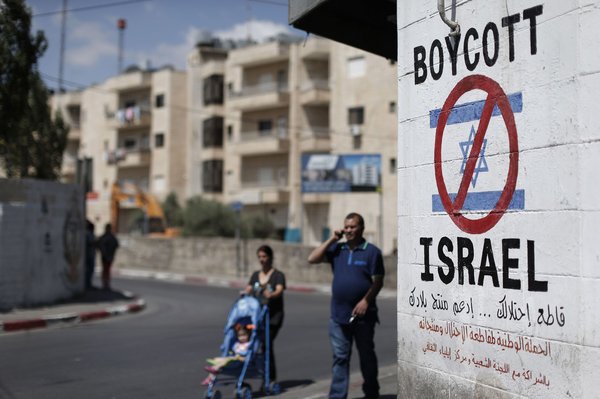South Carolina has become the first state to enact legislation aimed at thwarting an international pro-Palestinian economic and disinvestment campaign intended to penalize Israel. Illinois will soon become the second, and advocates say plans are underway for similar laws in 18 more states.
In Washington, Congress could vote this month on trade legislation with language that would encourage the blacklisting of foreign companies that support the pro-Palestinian campaign, known as Boycott, Divest and Sanction, or B.D.S. The trade legislation is notable in part because the scope of its blacklisting could include companies that refuse to do business with Israeli settlements in the occupied territories, even though they are widely considered illegal.
And in Las Vegas this weekend, Sheldon Adelson, the multibillionaire casino ownerwho is one of the Israeli government’s most important American supporters, is convening a private meeting of pro-Israel donors to devise new strategies for countering B.D.S., particularly on American college campuses, where it has gained some support since the Gaza war last summer.
Alarmed over what they see as the growing influence of B.D.S., Israel’s advocates in the United States, mirroring the reaction among many in Israel, are scrambling to respond. Some have embraced a call by the new Israeli justice minister, Ayelet Shaked, to “boycott the boycotters.”
The extent of B.D.S.’s popularity is hard to assess in the United States, where support for Israel remains overwhelmingly strong — something that boycott organizers concede. Still, the campaign’s effort to isolate Israel economically — even if it has yet to show any practical impact — has struck a nerve among many American Jews. They see the effort as a form of anti-Semitism, an accusation that B.D.S. supporters call a false, cynical and divisive scare tactic.
Willem Griffioen, executive director of the Israel Allies Foundations, an advocacy group that contributed to the effort to pass the law in South Carolina, described it as an important answer to the B.D.S. campaign.
“The timing and importance of this groundbreaking legislation cannot be overstated,” he said in a statement after Gov. Nikki R. Haley signed it on Thursday.
Under that law, all public entities in the state are prohibited from doing business with anyone who supports a boycott of any South Carolina trading partner.
Boycott organizers describe their movement as a nonviolent strategy modeled on the tenets of Gandhi and the Rev. Dr. Martin Luther King Jr., aimed at pressuring Israel to end its occupation and control of territories seized in the 1967 war so that Palestinians can have their own state.
Supporters of the campaign describe the anti-B.D.S. trade legislation as a barometer of their success so far in calling attention to what they see as blatant injustices against Palestinians.
The hostility to the boycott movement expressed by Prime Minister Benjamin Netanyahu of Israel, in the eyes of its supporters, speaks volumes about his anxiety over its potential.
“No matter what Netanyahu says by trying to divert discussion to attack this group, that cannot cover the fact that his government is involved in illegal activities in the occupied territories, especially in settlements,” Riyad H. Mansour, the Palestinian ambassador to the United Nations, said Friday in a telephone interview. “It cannot be defended, including by legislators in the United States of America.”
Boycott leaders call their effort analogous to the disinvestment campaign against South Africa’s apartheid system in the 1980s. As was the case back then, successful organizing led by American college students to pass nonbinding resolutions on divestment or product boycotts have increased.
Rahim Kurwa, a graduate student of sociology at the University of California, Los Angeles, and a member of Students for Justice in Palestine, an advocacy group, keeps a running tally of successful B.D.S. campus resolutions and referendums that have received a majority vote. By his count there have been 13 successes so far this year, compared with seven in 2014 and four in 2013.
Mr. Kurwa said the increased presence of B.D.S. organizers on campuses was particularly worrisome to advocates of Israel who have responded partly by offering student leaders free trips to Israel to influence their opinion. These trips typically emphasize the country’s diversity and tolerance, countering the Palestinian allegations of oppression.
“A lot of the response to the B.D.S. movement has been sort of an indirect response,” Mr. Kurwa said. “There’s sort of a lack of ideas that would compete with the international pressure on Israel. Instead, they’re trying to promote a good image of Israel that says, ‘There’s no problem here; there’s nothing to fix.’ ”
The anti-B.D.S. trade legislation efforts in states and in Congress, Mr. Kurwa said, are part of a new strategy by Israel’s advocates, but “none of these things gets back to a solution to end the occupation.”
The parallel drawn by the pro-Palestinian campaign to the anti-apartheid struggle offends many Israelis and their supporters, who see Israel as a beacon of democracy and morality surrounded by hostility, mayhem and malevolence. Many also say the boycott effort is a duplicitous way of seeking to delegitimize Israel.
“B.D.S. is the most extreme thing you can do,” said Thane Rosenbaum, senior fellow and director of the Forum on Law, Culture and Society at the New York University School of Law. The language used by B.D.S. supporters to describe Israel, he said, “is ignorant and absurd, if not anti-Semitic.”
Mr. Rosenbaum, who will participate in a panel on anti-Semitism this weekend at an annual conference in New York sponsored by The Jerusalem Post, said he believed that the B.D.S. movement in the United States was limited to “universities and some intellectual magazines,” but that nonetheless, “B.D.S. is always the elephant in the room.”
Mr. Kurwa said the effort by many Israel supporters to equate B.D.S. with anti-Semitism was “really sad and unfortunate.”
“There are three choices: a Palestinian state, Palestinian citizenship, or more occupation,” he said. “We’re either going to have the status quo, or something else. B.D.S. is really about picking.”





